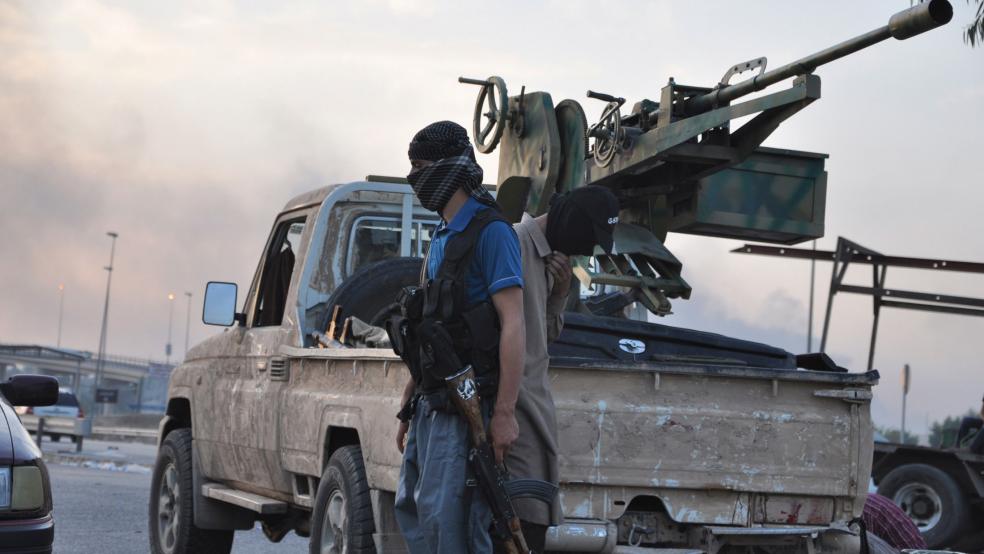Message to ISIS: Get ready, we’re coming.
While successful military strategy in wartime often hinges on surprise, the U.S. military took an unconventional path Thursday in announcing a plan to wage an early spring campaign to try to drive ISIS forces from the key city of Mosul in northern Iraq. The U.S. Central Command, or CENTCOM, which oversees the military coalition fight against ISIS in Iraq outlined the size and makeup of a force that the U.S. hopes will be ready for the offensive within five weeks at the earliest, as reported by Defense One and other news organizations.
Related: Marines on the Ground in Iraq as ISIS Burns 45 Alive
American forces are in the process of amassing and training 20,000 to 25,000 Iraqi and Kurdish forces for an effort to retake Mosul from an estimated 1,000 to 2,000 ISIS fighters.
Military officials doing the briefing really got into the weeds, revealing that the coalition’s attack force would consist of five Iraqi brigades that must first go through a U.S. training course. In addition, there would be three peshmerga brigades that would attack Mosul “from the north,” a newly formed “Mosul fighting force” of mostly Mosul police officers, and special operations forces of Iraq’s Counter Terrorism Service, according to the CENTCOM report.
Gen. Lloyd Austin, CENTCOM commander, and Martin Dempsey, chairman of the Joint Chiefs, are also apparently still mulling over a launch date for the offensive; it be may sometime in April or May. But that timetable could slide if enough Iraqi brigades have not completed their training, or other factors.
“Militarily, ISIL is in decline,” said the official who was doing the briefing, using the alternate acronym for ISIS. He claimed that the U.S.-led coalition had taken three-quarters of one military division’s worth of equipment and resources off the battlefield, according to Defense One. However, the official offered no clearer picture of the estimated sizes and state of ISIS fighters today.
Related: Kurds Are Close to Retaking Mosul from ISIS
It was far from clear why the U.S. military felt compelled to signal a crucial battle plan so far in advance of deployment. Analysts speculated on a range of possibilities – from trying to play head games with ISIS to giving Iraqi civilians in that area fair warning of major military action.
“Unless you’re fooling – unless this is an elaborate feint – it’s not normal practice to warn somebody that you’re coming,” Gordon Adams, a military historian and analyst at American University, said. “This is a little bizarre, it seems to me.”
NBC News Pentagon correspondent Jim Miklaszewski said Friday that the military news briefing might prompt ISIS to flood the area with troops in advance of the spring offensive. That would “give the Iraqi forces and the Kurdish forces sort of a centralized target – but keep them at a defensive crouch as opposed to launching offensive operations.”
“You [also] get a sense that the U.S. military certainly feels so besieged by all of this negative reporting coming out of Iraq that there has not been enough advancement by American airstrikes and the like that they would at least like to proffer up the possibility of a big win,” he told MSNBC.
Related: $100 Billion Cost of Fighting ISIS Is Just the Beginning
ISIS took Mosul in June, annexing the Iraqi territory to Syrian territory under the control of the jihadist terrorists. For many weeks, U.S.-backed forces have been trying to oust ISIS from Mosul through a combination of airstrikes and small-scale battles. In a bit of good news, the U.S.-backed fighters have wrested control of a highway that serves as a vital supply route for ISIS forces between Mosul and enclaves in northeastern Syria controlled by ISIS 300 miles away, The Washington Post reported yesterday.
Blocking the highway would pressure the Sunni fighters to rely on lengthier and potentially more dangerous routes to transport people, cash and weapons, The Post said.
Top Reads from The Fiscal Times:





